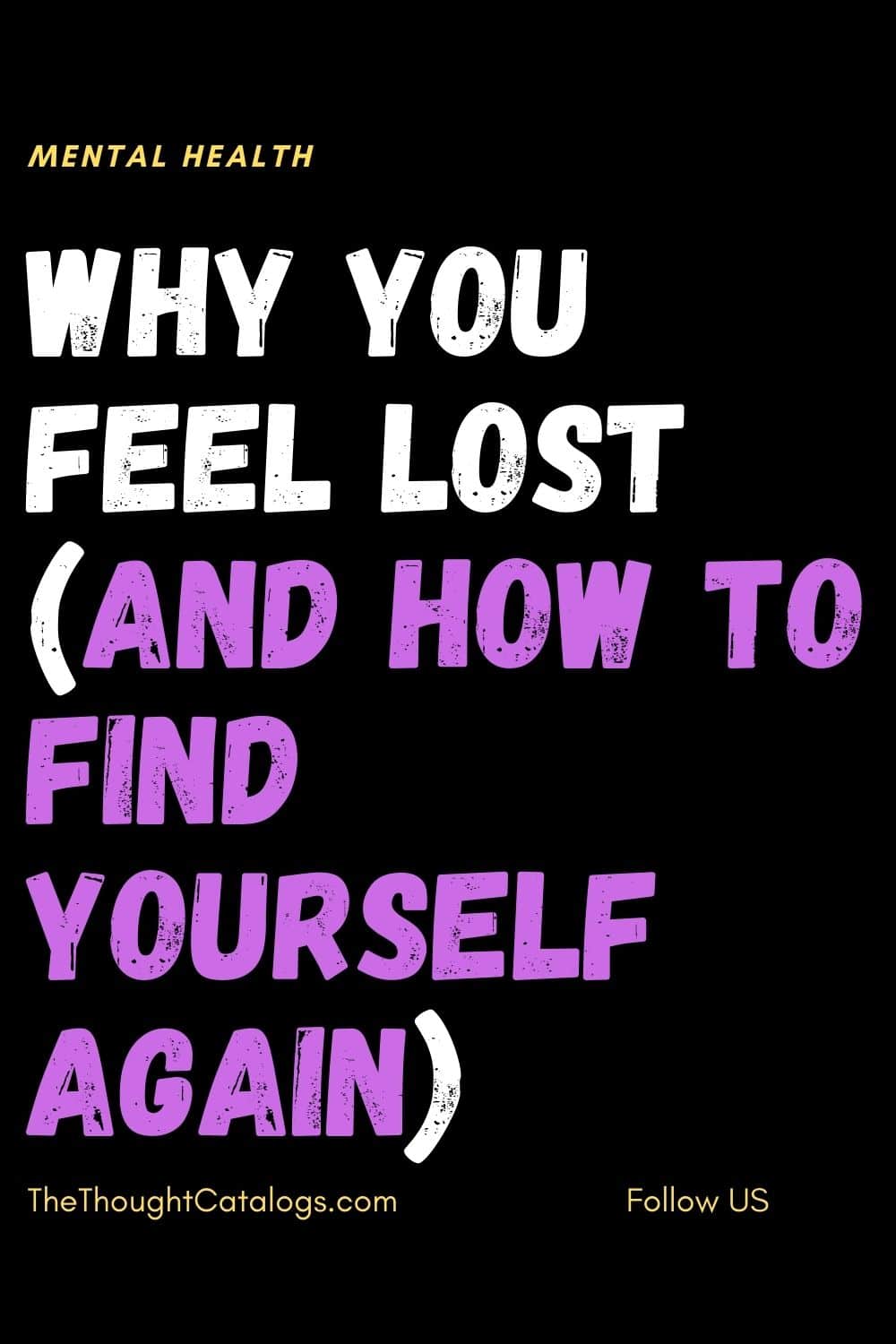Why You Feel Lost (And How To Find Yourself Again)

Have you ever experienced a sense of feeling lost in life? It’s a common phenomenon that many individuals go through at different stages. Feeling lost can be overwhelming and leave you wondering about your purpose and direction. In this article, we’ll explore the reasons behind feeling lost and provide practical strategies to help you rediscover yourself and find a sense of purpose once again.
1. Introduction
Life is a journey filled with ups and downs, twists and turns. At times, you may find yourself feeling adrift, uncertain of where you’re heading or what you truly want. This feeling of being lost can manifest in various ways, both emotionally and physically. However, it’s essential to remember that this experience is temporary, and there are steps you can take to find yourself again.
2. Understanding the Feeling of Being Lost
Before we delve into the solutions, it’s important to grasp the concept of feeling lost. It’s a multifaceted experience that can be triggered by various factors. Let’s explore some common causes and the emotional impact of feeling lost.
2.1 The Common Causes of Feeling Lost
Feeling lost can stem from different sources. It may arise from a lack of clarity regarding your goals and aspirations, a sense of disconnection from your values, or even the influence of external pressures. Understanding these causes can shed light on your journey.
2.2 The Emotional Impact of Feeling Lost
Feeling lost can have a profound emotional impact on individuals. It can lead to a range of emotions such as anxiety, sadness, frustration, and even a loss of self-confidence. Recognizing these emotions is the first step towards finding your way back to a more fulfilling life.
3. Recognizing the Signs of Feeling Lost
To address the issue of feeling lost, it’s important to recognize the signs and symptoms associated with this state of being. These signs can manifest in both physical and emotional ways, as well as through changes in behavior and lifestyle.
3.1 Physical and Emotional Symptoms
Feeling lost can manifest in physical symptoms such as fatigue, sleep disturbances, and changes in appetite. Emotionally, you may experience a lack of motivation, a persistent feeling of emptiness, or a sense of detachment from your surroundings.
3.2 Changes in Behavior and Lifestyle
When feeling lost, you may notice significant changes in your behavior and lifestyle. These changes could include withdrawing from social activities, neglecting self-care, or engaging in unhealthy coping mechanisms. Recognizing these changes is crucial for addressing the root causes of feeling lost.
4. Exploring the Reasons for Feeling Lost
To find yourself again, it’s essential to explore the underlying reasons behind feeling lost. This exploration can provide valuable insights into your journey and guide you toward discovering your purpose.
4.1 Lack of Purpose and Direction
One common reason for feeling lost is a lack of purpose and direction in life. When you’re unsure of your goals and aspirations, it’s easy to feel adrift and disconnected. Taking time to reflect on your values, passions, and long-term aspirations can help reignite a sense of purpose.
4.2 Major Life Changes and Transitions
Major life changes such as career shifts, relationship endings, or moving to a new city can trigger feelings of being lost. These transitions disrupt familiar routines and require adjustments, leaving you feeling unmoored. Embracing these changes as opportunities for growth and self-discovery can aid in finding yourself again.
4.3 External Influences and Societal Pressure
External influences, including societal pressure and expectations, can contribute to feeling lost. The pursuit of societal ideals rather than aligning with your authentic self can leave you feeling disconnected. Recognizing and challenging these influences is vital for reclaiming your sense of identity.
5. Rediscovering Yourself and Finding Purpose
Now that we’ve explored the reasons behind feeling lost, let’s delve into practical strategies for rediscovering yourself and finding purpose.
5.1 Reflecting on Personal Values and Passions
Reflecting on your values and passions is an essential step in finding yourself again. What truly matters to you? What activities bring you joy and fulfillment? By aligning your actions with your core values and engaging in activities that ignite your passion, you can rediscover your sense of self.
5.2 Setting Meaningful Goals
Setting meaningful goals is another crucial aspect of finding yourself again. When you have clear objectives to work towards, you regain a sense of direction and purpose. Start by setting small, achievable goals that align with your values and gradually work towards more significant milestones.
5.3 Exploring New Opportunities and Experiences
Exploring new opportunities and experiences can open doors to self-discovery. Step out of your comfort zone and try activities that pique your curiosity. Whether it’s learning a new skill, traveling to unfamiliar places, or engaging in creative endeavors, embracing new experiences can help you reconnect with yourself.
6. Building a Supportive Network
Building a supportive network is crucial when you’re on a journey to find yourself again. Surrounding yourself with like-minded individuals who uplift and inspire you can provide invaluable support and encouragement.
6.1 Seeking Professional Help
Sometimes, seeking professional help can be beneficial when you’re feeling lost. A therapist or counselor can provide guidance and tools to navigate through challenging emotions and uncover underlying issues.
6.2 Connecting with Like-minded Individuals
Connect with like-minded individuals who share similar interests and values. Engaging in meaningful conversations, joining communities or support groups, and attending events can help you expand your network and find support during your journey.
6.3 Surrounding Yourself with Positive Influences
Surround yourself with positive influences that inspire and motivate you. Whether it’s books, podcasts, or mentors, having role models who have overcome similar challenges can provide guidance and inspiration.
7. Practicing Self-Care and Self-Compassion
Taking care of yourself is essential when you’re finding your way back to a sense of self. Practicing self-care and self-compassion can help restore balance and nurture your well-being.
7.1 Taking Time for rest
While feeling lost, it’s important to prioritize rest. Set aside time for activities that promote relaxation, such as meditation, deep breathing exercises, or engaging in hobbies that bring you joy.
7.2 Engaging in Activities That Bring Joy
Engage in activities that bring you joy and rejuvenate your spirit. Whether it’s spending time in nature, practicing a hobby, or engaging in creative outlets, prioritizing activities that nourish your soul is crucial for finding yourself again.
7.3 Cultivating a Positive Mindset
Cultivating a positive mindset is a powerful tool for overcoming feelings of being lost. Practice gratitude, challenge negative thoughts, and focus on self-affirming beliefs. By shifting your perspective, you can foster resilience and rediscover your inner strength.
8. Embracing Change and Growth
Embracing change and growth is essential on your journey to finding yourself again. It’s important to accept imperfections, learn from mistakes, and embrace new opportunities.
8.1 Accepting Imperfections and Learning from Mistakes
No one is perfect, and accepting your imperfections is a crucial part of self-discovery. Embrace your mistakes as valuable learning experiences that contribute to personal growth. Allow yourself the freedom to grow and evolve without judgment.
8.2 Embracing New Opportunities
Embrace new opportunities that come your way. Even if they seem uncertain or challenging, they can provide valuable insights and pave the way for self-discovery. Stepping outside your comfort zone allows for personal and professional growth.
8.3 Continuously Evolving and Adapting
Recognize that finding yourself is an ongoing process. As you evolve, your values, interests, and aspirations may change. Embrace this evolution and remain open to new possibilities, continuously adapting to the ever-changing journey of self-discovery.
9. Conclusion
Feeling lost is a temporary state that many individuals experience. By understanding the underlying causes, recognizing the signs, and implementing practical strategies, you can find yourself again. Remember to reflect on your values, set meaningful goals, build a supportive network, practice self-care, and embrace change and growth. Rediscovering yourself is a journey worth taking—one that leads to a more fulfilling and purposeful life.
10. FAQs
Q1. How long does it take to find yourself again?
Finding yourself again is a unique and personal journey. The time it takes may vary depending on individual circumstances. Be patient with yourself and embrace the process.
Q2. Is feeling lost a sign of weakness?
Feeling lost is not a sign of weakness. It’s a natural part of the human experience and an opportunity for growth and self-discovery.
Q3. Can I find myself without making significant life changes?
Finding yourself doesn’t always require making significant life changes. Sometimes, small shifts in perspective, habits, or mindset can lead to profound self-discovery.
Q4. How can I overcome fear and uncertainty during this process?
Overcoming fear and uncertainty is a gradual process. Focus on building resilience, challenging limiting beliefs, and seeking support from loved ones or professionals.
Q5. What if I don’t know what I want in life?
Not knowing what you want in life is a common challenge. Begin by exploring your interests, values, and passions. Engage in new experiences to gain clarity and discover what truly resonates with you.




